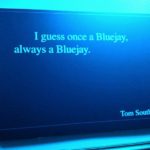https://youtu.be/-JRMjhOh95w
This weekend’s All-’70s Reunion reminded me of what I knew before but had forgotten: that our youth was drenched in music, and it played a big part in our moral and emotional development.
It started well before high school, of course. Take 1970, which produced some first-rate paeans to friendship that everyone will recognize by their first lines: “You and I must make a pact,” and “When you’re weary, feeling small, when tears are in your eyes, I will dry them all.”
I remember endless summer days at the Perry Pool in Pattee Park, hearing again and again the endless coda of “Layla,” another classic from 1970. What that Derek and the Dominoes anthem was “about” I could only partly grasp, and I filled in a lot of gaps with my own childish ideas.
The same went for lots of other songs both before and after 1970, such as the one beginning, “I am just a poor boy though my story’s seldom told” (1970). The words exceeded my mental maturity — or rather immaturity. Such songs were “literary” in the same sense that recently earned Bob Dylan a Nobel Prize for literature.
But music can reach us and influence us emotionally quite apart from our understanding. That is its power. KIOA pumped out loads of pop pabulum during the 1970s, utter drivel, but some of those songs struck an emotional tone that literally haunted my childhood.
The tone is described simply enough: the songs were sad, sometimes sad even to despair. When Carly Simon sang in 1971, “My father sits at night with no lights on,” and later sings, “And yet they drink, they laugh, close the wound, hide the scar,” she cast a shadow on my 12-year-old soul that never wholly passed.
Janis Ian affected me the same way in 1975, singing, “I learned the truth at 17 that love was meant for beauty queens and high school girls with clear-skinned smiles who married young and then retired,” and later, “The small-town eyes will gape at you in dull surprise when payment due exceeds accounts received at 17.”
These songs puzzled me. They disturbed me. They were love songs of a mournful sort but with a strong dose of social comment and social criticism that was scary but also instructive. I was entirely too young to understand “Mrs. Robinson” in 1968, but the songs of the ’70s started getting through.
Sometimes they even descended to suicidal gloom, as in the 1971 ballad by Gilbert O’Sullivan:
In a little while from now,
If I’m not feeling any less sour,
I promise myself to treat myself
And visit a nearby tower,
And climbing to the top,
Will throw myself off
In an effort to
Make it clear to whoever
What it’s like when you’re shattered.
Was Dic Youngs undermining my moral fiber and that of my schoolfellows by playing such stuff over and over and over between the commercials? Would we all have been better off shielded from the effects of existential nihilism and modern mass marketing and instead spent our evenings singing “Onward, Christian Soldiers” and “Up, Up with People” as our elders would no doubt have preferred?
But had things really changed much in the 1960s? Gilbert O’Sullivan was obviously not the first to note that the course of true love never did run smooth. Leadbelly, for instance, recorded “Goodnight, Irene” in 1933, singing, “Sometimes I live in the country. Sometimes I live in town. Sometimes I take a great notion to jump in the river and drown. Irene, goodnight,” and so on.
Songs are often sad because life is often sad. That seems plain enough.
And the songs certainly were not all sad in the ’70s. Some were life affirming in the extreme. In 1976 we heard, “And you and your sweet desire, you took me higher and higher, baby,” and that was on the mild side. We had definitely outgrown D. H. Lawrence, and there was no need to read between the lines of songs such as Foghat’s “I Just Want to Make Love to You” (1972) or Bad Company’s “Feel Like Making Love” (1975) or Exile’s “I Want to Kiss You All Over” (1978).
There were good times. There were happy days.
As for me, I “finally decided my future lies beyond the yellow brick road” (1973), and “I got that green light, baby. I got to keep movin’ on” (1974).
I do not want to overstate the case. The sad songs stuck in my brain, but so did the rest of them, good, bad and unfortunately unforgettable. The soundtrack of the 1970s was a big part of my sentimental education, maybe the biggest. I do not presume this was the case with everyone. As Leonard Cohen wisely sang,
Now, I’ve heard there was a secret chord
That David played, and it pleased the Lord,
But you don’t really care for music, do you?
Still I think Plato was right when he said music is very important to the social order. Songs in the Doric mode still move the warriors to slaughter. But music also has charms to soothe a savage breast.
The all-’70s class reunion, which was a lot of fun, inevitably raises questions, such as, “If we had the chance to do it all again, tell me, would we? could we?” (1973). Oh, hell yes! You bet your life. To do something once is to affirm its eternal recurrence. I willed it thus. Like Beethoven said, Es musse sein.
So we beat on and “believe we’re gliding down the highway when in fact we’re slip sliding away” (1977).




































“Drove my Chevy to the levy, but the levy was dry” because I graduated in ’65! Ha Ha Ha! Well written, well organized and well executed, my friend. As Bob Hope would say, “Thanks for the Memories.”